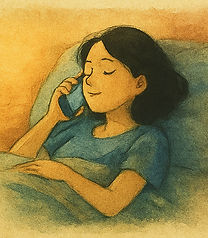
When It All Changed


There’s a before, and then there’s an after.
When Anna moved to Pune in March 2024 to begin her new chapter as a Chartered Accountant, she didn’t just bring luggage; she brought dreams. Of starting her career. Of making her family proud.
“It’s intense,” she told her parents. “But I want to learn. I want to grow.”

The hours were long. The pressure never stopped. But she didn’t retreat into silence. Even if it was midnight or past midnight, she made sure to call her mother every night. She shared what she was going through, the stress, the workload, but always with hope.
“It’ll get better,” she’d say. “This is how it is in the beginning.”
She believed this was just a phase, a tough start to something meaningful.



By July, the signs of strain were there. But Anna kept going. Her parents came to Pune for her convocation, a moment she had been looking forward to for years. She had paid for their flight tickets herself.
“It’s my dream,” she’d told them. “To take you both with me, with my own money.”
But even on the morning of her convocation, she was working, laptop open, deadlines pending. They reached the venue late. She smiled in the photographs, but the exhaustion was hard to miss.

That same week, she had been complaining of chest pain. Breathlessness. Her parents took her to the hospital. The ECG came back normal. The doctor said it was just exhaustion, too little sleep, irregular meals. Nothing serious.
She believed it. They all did.
And she went back to work.
Two weeks later, on July 20th, she collapsed in her PG room.
Cardiac arrest, they said.
No history of illness. No warning signs that doctors could see.
She was just 26.
But those who knew her, really knew her, understood what the reports didn’t say. It wasn’t just her heart that failed. It was the pressure. The relentless pace. The invisible weight of being new, eager, and endlessly available.

Her mother, days after the funeral, wrote a letter. Not to accuse. But to remember and to speak the truth. She wrote of Anna’s long nights, her determination, her silence in pain, her refusal to complain. Of how no one from her workplace came. Of how her daughter didn’t know how to say “no.”
She was a fighter. She didn’t believe in quitting. She was trying to prove herself, to grow, the way so many young professionals try to do when they enter the workforce for the first time.
A letter no parent should ever have to write, but one that resonated deeply across the country.
“Anna was not weak. She was strong and brave. She bore pain quietly and smiled through the struggle… She never blamed anyone, not even in her final moments. But I cannot stay silent anymore.”
The letter did not seek blame, it sought truth. And in that truth, it struck a chord.


Thousands read it. Many saw in Anna’s story the echoes of their own, the pressure to constantly deliver, the anxiety of never feeling ‘enough’, the loneliness of suffering in silence.
Her story began a larger conversation about workplace burnout, unrealistic expectations, and the mental and physical cost of toxic work cultures, especially for young professionals just starting.
This isn’t a blame story.
It’s a wake-up call.
Anna’s story speaks. Loudly.
She did everything the world asked of her and more.
But sometimes, the world asks too much. And forgets to notice when someone’s breath is breaking beneath the surface.
She wasn’t weak. She wasn’t sick.
She was overwhelmed, and she kept going anyway.